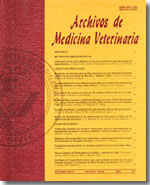Antibodies findings against Leptospira sp., of the serovars Panama, Lai, Australis, Shermani, and Patoc, in a group of rhesus monkeys (Macaca mulatta) in conditions of captivity
Main Article Content
Abstract
During the last decade leptospirosis has emerged as a worldwide and very important infectious disease, affecting different environments from urban to rural, with carriers usually being wild or domestic animals. The objective of this study was to evaluate the presence of antibodies against Leptospira in rhesus monkeys (Macaca mulatta) in a Research Center. Fifty nine non-human primates of different physiological stages were studied. The animals were held in groups and in individual cages. Blood samples were obtained from the saphenous vein to determine the presence of antibodies through the microscopic agglutination test (MA), using twenty five serovars of Leptospira as antigens. It was observed that 18 out of the 59 monkeys (30.50%) reacted against one or more serovars of Leptospira. In this study, antibodies of 4 serovars of Leptospira, (Panama, Lai, Australis, and Shermani) were detected. All 4 serovars were considered pathogenic for different mammals, including human beings, and eleven of the samples also reacted against the Patoc serovar, which is considered non pathogen and saprophyte. None of the studied animals that had a positive result against Leptospira presented any clinical signs compatible with leptospirosis.

